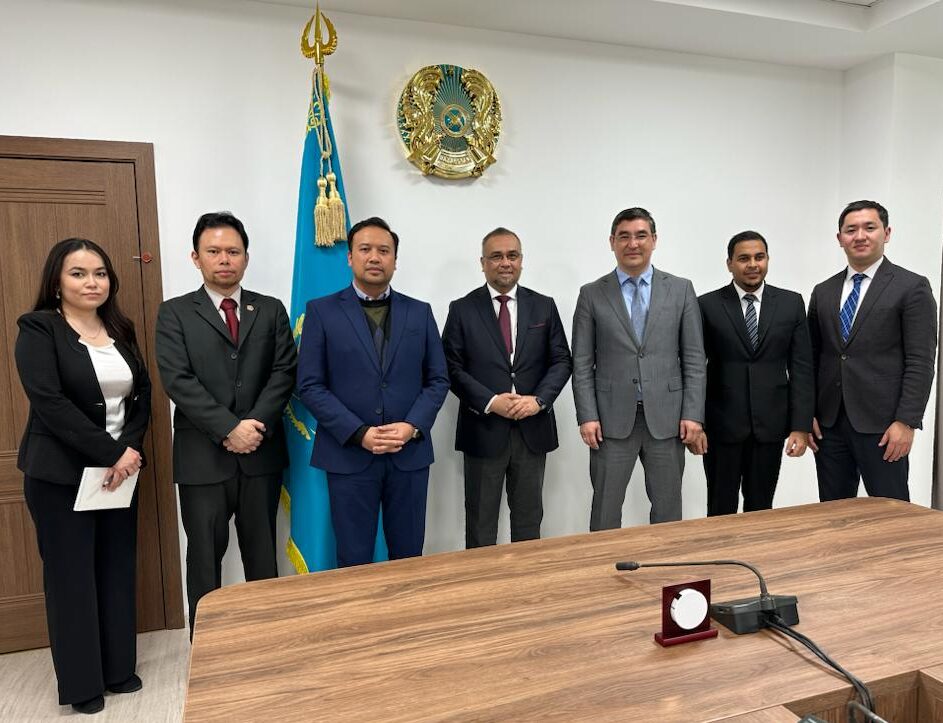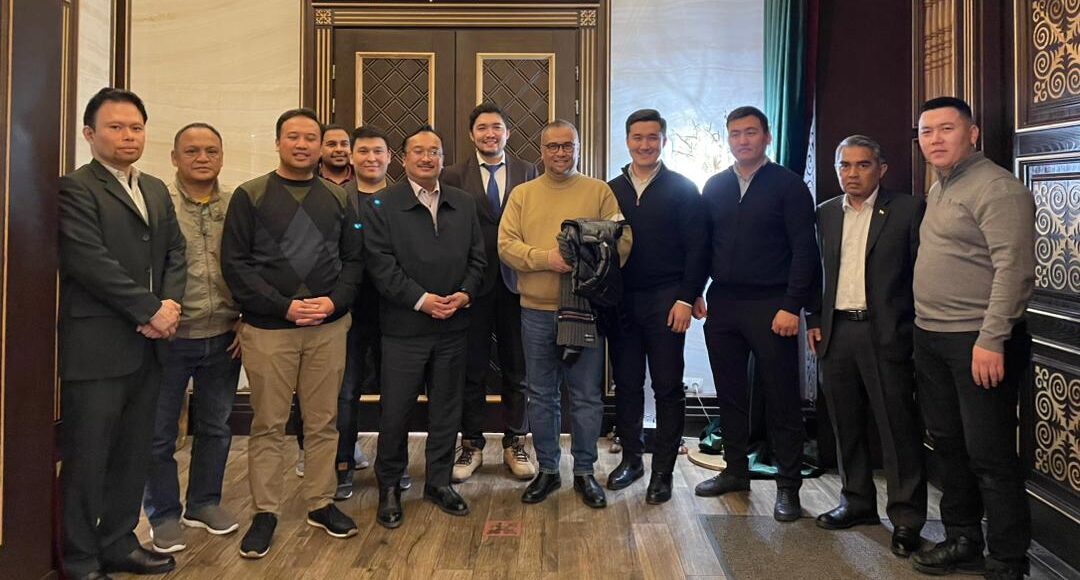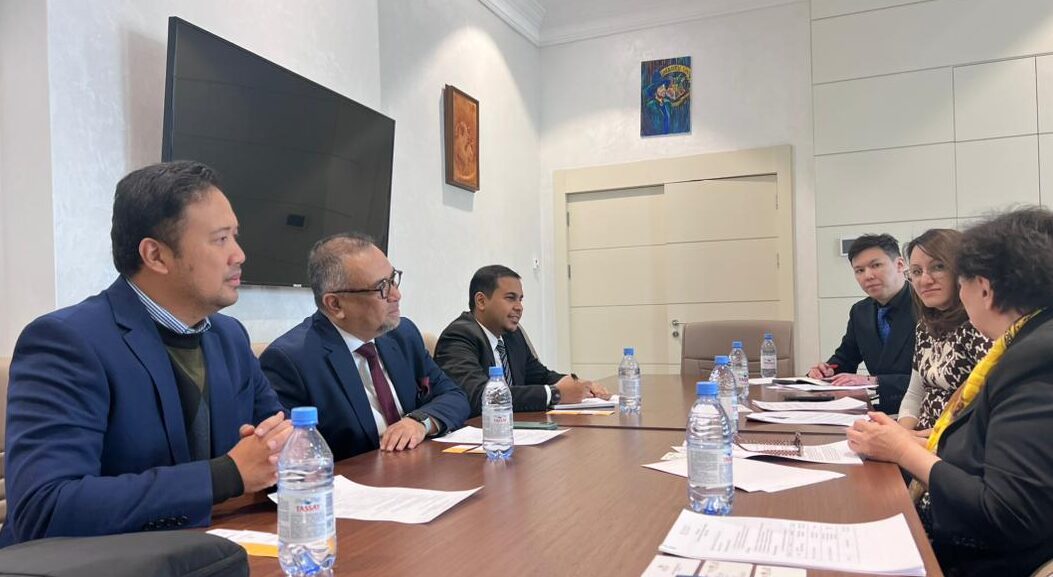ASTANA – The Education Malaysia Global Services (EMGS) took a step towards establishing stronger ties with Kazakhstan in higher education by embarking on a four-day visit to the country this March.

Abdul Razak Ahmad, the Chairman of EMGS, (C) and Kuanysh Yergaliyev, the Vice Minister of Science and Higher Education of Kazakhstan (C) during the meeting in Astana. Photo credit: gov.kz.
The agency aims to enhance collaboration and strategic partnerships with Kazakh officials while promoting its activities and exploring potential opportunities during the visit. This move is expected to further strengthen the academic partnership between the two nations and provide students with more options for international education.
Abdul Razak Ahmad, the Chairman of EMGS, has outlined the agency’s plans to deepen ties with Kazakhstan in an exclusive interview with The Astana Times.
“The Kazakh government has a vision of making Kazakhstan a scientific society. We were excited to learn its vision and plans to transform areas of engineering sciences, and the country’s aspirations of getting many foreign universities to set up their campuses in the country. That liberalization of higher education is brave. It is very promising. I believe Central Asia will be the hub of knowledge and Kazakhstan will be the hub of knowledge for Central Asia one day,” said Abdul Razak Ahmad.

Dinner with Alumni of Malaysian Universities in Astana. Photo credit: gov.kz.
Established under the Ministry of Higher Education, EMGS assists international students pursuing higher education at Malaysia’s universities, as well as language and training centers. The agency is also engaged in promoting education in Malaysia.
“We are not interested in just bringing students to Malaysia, we are interested in pursuing all kinds of collaborations with partners from any parts of the world in the area of education and scientific research. So EMGS is about how we can actually facilitate the globalization of the Malaysian higher education sector,” he said.
Abdul Razak Ahmad noted that Central Asia, particularly Kazakhstan, is of particular strategic interest to Malaysia in the sphere of education.
“We have seen the number of Kazakh students increasing from year to year over the last 20 years, except during the pandemic years. Of course, we want more students to come, but we also want Malaysian students to study in Kazakhstan. Unfortunately, we don’t have any students partly because we have little understanding of your system. Things have to change. We have to pursue collaborative research. The reason we categorize Kazakhstan as a core strategic interest in Malaysia is because of the country’s advancements in pure sciences, mathematics, and physics. These are important areas where talents are very scarce. By cooperating with Kazakhstan, we will be able to bring some good talents in this area to study in Malaysia and some of our talents could also study in Kazakhstan in the sphere of pure sciences,” he said.

The Malaysian delegation meets with the representatives of Nazarbayev University in Astana. Photo credit: gov.kz.
Mobility, internships, and global research can also bring Malaysia-Kazakhstan cooperation in higher education to a strategic level.
Malaysia is an important destination due to its long traditions in higher education and is also “the gateway for Kazakhstan to understand more of the dynamics of Southeast Asia, the fastest growing countries of Asia.”
Malaysia also intends to create a graduate visa scheme for its international students with the option to continue to find jobs, take part in internships, or work on a startup.
The Malaysian delegation held talks with the Kazakh Ministry of Science and Higher Education and the top management of the Center for International Programs in Astana.
“I am impressed with the Bolashak program. It creates a strong impetus for human capital development in Kazakhstan. The country has a systematic way of planning for the needs of future talent. My only hope is that the center will consider sending more students to Malaysia. The requirement is now to send students to the top universities in the world. But many Malaysian universities do not subscribe to the ranking system of the West. In this regard, it would be great for your officials to visit Malaysia to understand how we evaluate quality, to see the current facilities we have, and to witness the recognition of many other countries in regards to our universities. Our intention is to have a strategic collaboration with them,” he noted.
Abdul Razak Ahmad also spoke about the challenges in the education sector after the pandemic.
“The main challenge is access and equity. Many people aspire to go to universities, however the cost of education is getting expensive. People with disabilities face challenges. The [rate of] participation of women in higher education globally is a concern. The other concern is financing in higher education. The government has very limited resources. Research is much more expensive. The government must reinvent a new way of financing higher education,” he said.
Abdul Razak Ahmad believes that online education can never replace traditional learning.
“Internationalization has always been one-sided. People go either to Europe, or America, or Australia, or maybe Japan. It is time for us to look at non-traditional countries such as India, South Korea, Malaysia, Indonesia, and Central Asia. There’s so much to learn from everyone. It is important for us to encourage our government to be adventurous, and to send our students to every part of the world. They will learn something, and will definitely be able to bring a lot of new perspectives,” he added.

